- Home
- Anthony Trollope
The Small House at Allington Page 5
The Small House at Allington Read online
Page 5
A useful collection of critical essays on The Barsetshire Novels appears in the Macmillan Casebook volume, edited by Tony Bareham (1983). This includes a selection of early reviews of The Small House at Allington, though the accounts of the novel included not only (predictably, in an anthology of Barsetshire criticism) marginalize, it, but also somewhat undervalue it.
Virginia Woolf praises the novel highly in ‘The Novels of George Meredith’ (1928) in The Common Reader: Second Series (1932), constellating it with Pride and Prejudice as those ‘two perfect novels’. Of separate studies of The Small House at Allington, that by Juliet McMaster is noteworthy: ‘The Unfortunate Moth’, Nineteenth Century Fiction 26 (1971), pp. 127–44; reprinted in modified form in Juliet McMaster, Trollope’s Palliser Novels (1978).
CONTENTS
VOLUME I
1 The Squire of Allington
2 The Two Pearls of Allington
3 The Widow Dale of Allington
4 Mrs Roper’s Boarding-house
5 About L.D.
6 Beautiful Days
7 The Beginning of Troubles
8 It Cannot Be
9 Mrs Dale’s Little Party
10 Mrs Lupex and Amelia Roper
11 Social Life
12 Lilian Dale Becomes a Butterfly
13 A Visit to Guestwick
14 John Eames Takes a Walk
15 The Last Day
16 Mr Crosbie Moets and Old Clergyman on His Way to Courcy Castle
17 Courcy Castle
18 Lily Dale’s First Love-Letter
19 The Squire Makes a Visit to the Small House
20 Dr Crofts
21 John Eames Encounters Two Adventures, and Displays Great Courage in Both
22 Lord De Guest at Home
23 Mr Plantagenet Palliser
24 A Mother-in-law and a Father-in-law
25 Adolphus Crosbie Spends and Evening at His Club
26 Lord De Courcy in the Bosom of His Family
27 ‘On My Honour, I Do Not Understand It’
28 The Board
29 John Eames Returns to Burton Crescent
30 ‘Is it from Him?’
VOLUME II
31 The Wounded Fawn
32 Pawkins’s in Jermyn Street
33 ‘The Time well Come’
34 The Combat
35 Vae Victis
36 ‘See, the Conquering Hero Comes’
37 An Old Man’s Complaint
38 Dr Crofts is Called in
39 Dr Crofts is Turned out
40 Preparations for the Wedding
41 Domestic Troubles
42 Lily’s Bedside
43 Fie, Fie!
44 Valentine’s Day at Allington
45 Valentine’s Day in London
46 John Eames at His Office
47 The New Private Secretary
48 Nemesis
49 Preparations for Going
50 Mrs Dale in Thankful for a Good Thing
51 John Eames Does Things Which He Ought Not to Have Done
52 The First Visit to the Guestwick Bridge
53 Loquitur Hopkins
54 The Second Visit to the Guestwick Bridge
55 Not Very Fie Fie After All
56 Showing How Mr Crosbie Became Again a Happy Man
57 Lilian Dale Vanquishes Her Mother
58 The Fate of the Small House
59 John Eames Becomes a Man
60 Conclusion
VOLUME I
CHAPTER 1
THE SQUIRE OF ALLINGTON
OF COURSE there was a Great House at Allington. How otherwise should there have been a Small House? Our story will, as its name imports, have its closest relations with those who lived in the less dignified domicile of the two; but it will have close relations also with the more dignified, and it may be well that I should, in the first instance, say a few words as to the Great House in its owner.
The squires of Allington had been squires of Allington since squires, such as squires are now, were first known in England. From father to son, and from uncle to nephew, and, in one instance, from second cousin to second cousin, the sceptre had descended in the family of the Dales; and the acres had remained intact, growing in value and not decreasing in number, though guarded by no entail1 and protected by no wonderful mount of prudence or wisdom. The estate of Dale of Allington had been coterminous with the parish of Allington for some hundreds of years; and though, as I have said, the race of squires had possessed nothing of superhuman discretion, and had perhaps been guided in their walks through life by no very distinct principles, still there had been with them so much of adherence to a sacred law, that no acre of the property had ever been parted from the hands of the existing squire. Some futile attempts had been made to increase the territory, as indeed had been done by Kit Dale, the father of Christopher Dale, who will appear as our squire of Allington when the persons of our drama are introduced. Old Kit Dale, who had married money, had bought outlying farms – a bit of ground here and a bit there – talking, as he did so, much of political influence and of the good old Tory cause. But these farms and bits of ground had gone again before our time. To them had been attached no religion. When old Kit had found himself pressed in that matter of the majority of the Nineteenth Dragoons, in which crack regiment his second son made for himself quite a career, he found it easier to sell than to save – seeing that that which he sold was his own and not be the patrimony of the Dales. At his death the remainder of these purchases had gone. Family arrangements required completion, and Christopher Dale required ready money. The outlying farms flew away, as such new purchases had flown before, but the old patrimony of the Dales remained untouched, as it had ever remained.
It had been a religion among them; and seeing that the worship had been carried on without fail, that the vestal fire had never gone down upon the hearth, I should not have said that the Dales had walked their ways without high principle. To this religion they had all adhered, and the new heir had ever entered in upon his domain without other encumbrances than those with which he himself was then already burdened. And yet there had been no entail. The idea of an entail was not in accordance with the peculiarities of the Dale mind. It was necessary to the Dale religion that each squire should have the power of wasting the acres of Allington – and that he should abstain from wasting them. I remember to have dined at a house, the whole glory and fortune of which depended on the safety of a glass goblet. We all know the story. If the luck of Edenhall2 should be shattered, the doom of the family would be sealed. Nevertheless I was bidden to drink out of the fatal glass, as were all guests in that house. It would not have contented the chivalrous mind of the master of protect his doom by lock and key and padded chest. And so it was with the Dales of Allington. To them an entail would have been a lock and key and a padded chest; but the old chivalry of their house denied to them the use of such protection.
I have spoken something slightingly of the acquirements and doings of the family; and indeed their acquirements had been few and their doings little. At Allington, Dale of Allington had always been known as a king. At Guestwick, the neighbouring market town, he was a great man – to be seen frequently on Saturdays, standing in the market-place, and laying down the law as to barley and oxen among men who knew usually more about barley and oxen than did he. At Hamersham, the assize town, he was generally in some repute, being a constant grand juror for the county, and a man who paid his way. But even at Hamersham the glory of the Dales had, at most periods, begun to pale, for they had seldom been widely conspicuous in the county, and had earned no great reputation by their knowledge of jurisprudence in the grand-jury room. Beyond Hamerham their fame had not spread itself.
They had been men generally built in the same mould, inheriting each from his father the same virtues and the same vices – men who would have lived, each, as his father had lived before him, had not the new ways of the world gradually drawn away with them, by an invisible magnetism, the
upcoming Dale of the day – not indeed in any case so moving him as to bring him up to the spirit of the age in which he lived, but dragging him forward to a line in advance of that on which his father had trodden. They had been obstinate men; believing much in themselves; just according to their ideas of justice; hard to their tenants – but not known to be hard even by the tenants themselves, for the rules followed had ever been the rules on the Allington estate; imperious to their wives and children, but imperious within bounds, so that no Mrs Dale had fled from her lord’s roof, and no loud scandals had existed between father and sons; exacting in their ideas as to money, expecting that they were to receive much and to give little, and yet not thought to be mean, for they paid their way, and gave money in parish charity and in county charity. They had ever been steady supporters of the Church, graciously receiving into their parish such new vicars as, from time to time, were sent to them from King’s College, Cambridge, to which establishment the gift of the living belonged – but, nevertheless, the Dales had ever carried on some unpronounced warfare against the clergyman, so that the intercourse between the lay family and he clerical had seldom been in all respects pleasant.
Such had been the Dales of Allington, time out of mind, and such in all respects would have been the Christopher Dale of our time, had he not suffered two accidents in his youth. He had fallen in love with a lady who obstinately refused his hand,3 and on her account he had remained single; that was his first accident. The second had fallen upon him with reference to his father’s assumed wealth. He had supposed himself to be richer than other Dales of Allington when coming in upon his property, and had consequently entertained an idea of sitting in Parliament for his county. In order that he might attain this honour he had allowed himself to be talked by the men of Hamersham and Guestwick out of his old family politics, and had declared himself a Liberal. He had never gone to the poll, and, indeed, had never actually stood for the seat. But he had come forward as a liberal politician, and had failed; and, although it was well known to all around that Christopher Dale was in heart as thoroughly conservative as any of his forefathers, this accident had made him sour and silent on the subject of politics, and had somewhat estranged him from his brother squires.
In other respects our Christopher Dale was, if anything, superior to the average of the family. Those whom he did love he loved dearly. Those whom he hated he did not ill-use beyond the limits of justice. He was close in small matters of money, and yet in certain family arrangements he was, as we shall see, capable of much liberality. He endeavoured to do his duty in accordance with his lights, and had succeeded in weaning himself from personal indulgences, to which during the early days of high hopes he had become accustomed. And in that matter of his unrequited love he had been true throughout. In his hard, dry, unpleasant way he had loved the woman; and when at last he learned to know that she would not have his love he had been unable to transfer his heart to another. This had happened just at the period of his father’s death, and he had endeavoured to console himself with politics, with what fate we have already seen. A constant, upright, and by no means insincere man was our Christopher Dale – thin and meagre in his mental attributes, by no means even understanding the fullness of a full man, with power of eye-sight very limited in seeing aught which was above him, but yet worthy of regard in that he had realized a path of duty and did endeavour to walk therein. And, moreover, our Mr Christopher Dale was a gentleman.
Such in character was the squire of Allington, the only regular inhabitant of the Great House. In person, he was a plain, dry man, with short grizzled hair and thick grizzled eyebrows. Of beard, he had very little, carrying the smallest possible grey whiskers, which hardly fell below the points of his ears. He eyes were sharp and expressive, and his nose was straight and well formed – as was also his chin. But the nobility of his face was destroyed by a mean mouth with thin lips; and his forehead, which was high and narrow, though it forbade you to take Mr Dale for a fool, forbade you also to take him for a man of great parts, or of wide capacity. In height, he was about five feet ten; and at the time of our story was as near to seventy as he was to sixty. But years had treated him very lightly, and he bore few signs of age. Such in person was Christopher Dale, Esq., the squire of Allington, and owner of some three thousand a year, all of which proceeded from the lands of that parish.
And now I will speak of the Great House of Allington. After all, it was not very great; nor was it surrounded by much of that exquisite nobility of park appurtenance which graces the habitations of most of our old landed proprietors. But the house itself was very graceful. It had been built in the days of the early Stuarts, in that style of architecture to which we give the name of the Tudors. On its front it showed three pointed roofs, or gables, as I believe they should be called; and between each gable a thin tall chimney stood, the two chimneys thus raising themselves just above the three peaks I have mentioned. I think that the beauty of the house depended much on those two chimneys; on them, and on the mullioned windows with which the front of the house was closely filled. The door, with its jutting porch, was by no means in the centre of the house. As you entered, there was but one window on your right hand, while on your left there were three. And over these there was a line of five windows, one taking its place above the porch. We all know the beautiful old Tudor window, with its stout stone mullions and its stone transoms, crossing from side to side at a point much nearer to the top than to the bottom. Of all windows ever invented it is the sweetest. And here, at Allington, I think their beauty was enhanced by the fact that they were not regular in their shape. Some of these windows were long windows, while some of them were high. That to the right of the door, and that at the other extremity of the house, were among the former. But the others had been put in without regard to uniformity, a long window here, and a high window there, with a general effect which could hardly have been improved. The above, in the three gables, were three other smaller apertures. But these also were mullioned, and the entire frontage of the house was uniform in its style.
Round the house there were trim gardens, not very large, but worthy of much note in that they were so trim – gardens with broad gravel paths, with one walk running in front of the house so broad as to be fitly called a terrace. But this, though in front of the house, was sufficiently removed from it to allow of a coach-road running inside it to the front door. The Dales of Allington had always been gardeners, and their garden was perhaps more noted in the county than any other of their properties. But outside the gardens no pretensions had been made to the grandeur of a domain. The pastures round the house were but pretty fields, in which timber was abundant. There was no deer-park at Allington; and though the Allington woods were well known, they formed no portion of a whole of which the house was a part. They law away, our of sight, a full mile from the back of the house; but not on that account of less avail for the fitting preservation of foxes.
And the house stood much too near the road for purposes of grandeur, had such purposes of grandeur, had such purposes ever swelled the breast of any of the squires of Allington. But I fancy that our ideas of rural grandeur have altered since many of our older country seats were built. To be near the village, so as in some way to afford comfort, protection, and patronage, and perhaps also with some view to the pleasantness of neighbourhood for its own inmates, seemed to be the object of a gentleman when building his house in the old days. A solitude in the centre of a wide park is now the only site that can be recognized as eligible. No cottage must be seen, unless the cottage orné4 of the gardener. The village, if it cannot be abolished, must be got out of sight. The sound of the church bells is not desirable, and the road on which the profane vulgar travel by their own right must be at a distance. When some old Dale of Allington built his house, he thought differently. There stood the church and there the village, and, pleased with such vicinity, he sat himself down close to his God and to his tenants.
As you pass along the road from Guestwick into the
village you see the church near to you on your left hand; but the house is hidden from the road. As you approach the church, reaching the gave of it which is not above two hundred yards from the high road, you see the full front of the Great House. Perhaps the best view of it is from the churchyard. The lane leading up to the church ends in a gate, which is the entrance into Mr Dale’s place. There is no lodge there, and the gate generally stands open – indeed, always does no, unless some need of cattle grazing within requires that it should be closed. But there is an inner gate, leading from the home paddock through the gardens to the house and another inner gate, some thirty yards farther on, which will take you into the farmyard. Perhaps it is a defect at Allington that the farmyard is very close to the house. But the stables, and the strawyards, and the unwashed carts, and the lazy lingering cattle of the homestead, are screened off by a row of chestnuts, which, when in its glory of flower, in the early days of May, no other row in England can surpass in beauty. Had anyone told Dale of Allington – this Dale or any former Dale – that his place wanted wood, he would have pointed with mingled pride and distain to his belt of chestnuts.
Of the church itself I will say the fewest possible number of words. It was a church such as there are, I think, thousands in England – low, incommodious, kept with difficulty in repair, too often pervious to the wet, and yet strangely picturesque, and correct too, according to great rules of architecture. It was built with a nave and aisles, visibly in the form of a cross, though with its arms clipped down to the trunk, with a separate chancel, with a large square short tower, and with a bellshaped spire, covered with lead and irregular in its proportions. Who does not know the low porch, the perpendicular Gothic window, the flat-roofed aisles, and the noble old grey tower of such a church as this? As regards its interior, it was dusty; it was blocked up with high-backed ugly pews; the gallery in which the children sat at the end of the church, and in which two ancient musicians blew their bassoons,5, was all awry, and looked as though it would fall; the pulpit was an ugly useless edifice, as high nearly as the roof would allow, and the reading-desk under it hardly permitted the person of keep his head free from the dangling tassels of the cushion above him. A clerk also was there beneath him, holding a third position somewhat elevated;6 and upon the whole things were not quite as I would have had them. But nevertheless, the place looked like a church, and I can hardly say so much for all the modern edifices which have been built in my days towards the glory of God. It looked like a church, and not the less so because in walking up the passage between the pews the visitor trod upon the brass plates which dignified the resting-places of the departed Dales of old.

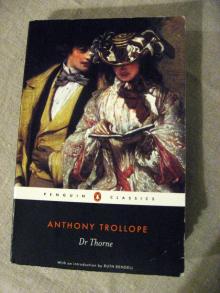 Doctor Thorne
Doctor Thorne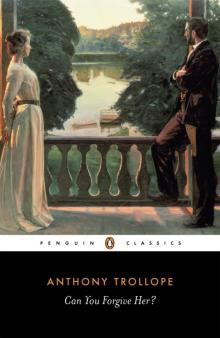 Can You Forgive Her?
Can You Forgive Her?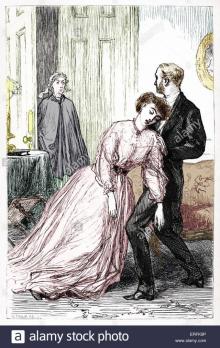 The Last Chronicle of Barset
The Last Chronicle of Barset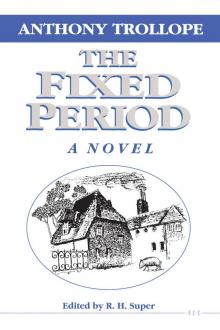 The Fixed Period
The Fixed Period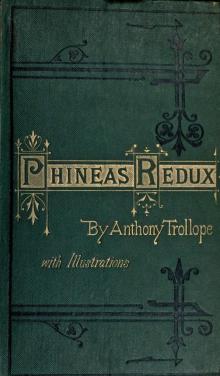 Phineas Redux
Phineas Redux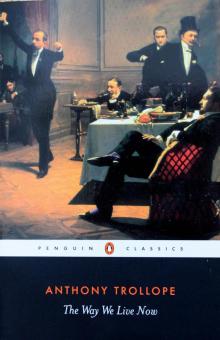 The Way We Live Now
The Way We Live Now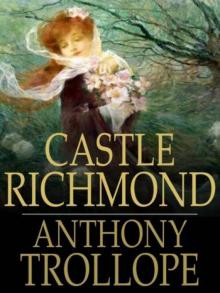 Castle Richmond
Castle Richmond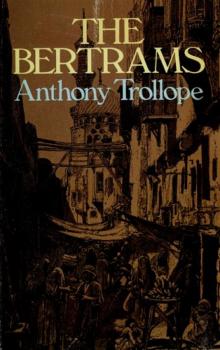 The Bertrams
The Bertrams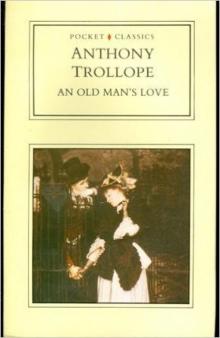 An Old Man's Love
An Old Man's Love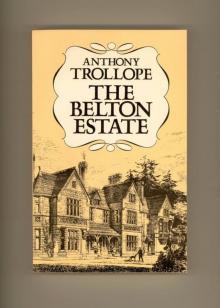 The Belton Estate
The Belton Estate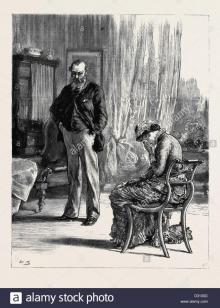 Marion Fay: A Novel
Marion Fay: A Novel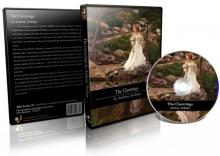 The Claverings
The Claverings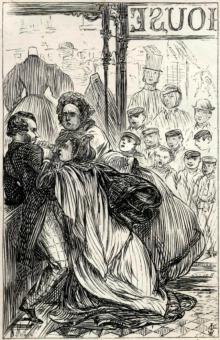 The Struggles of Brown, Jones, and Robinson
The Struggles of Brown, Jones, and Robinson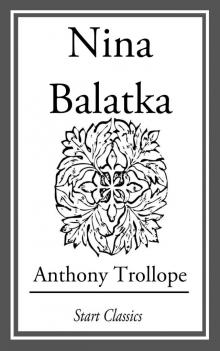 Nina Balatka
Nina Balatka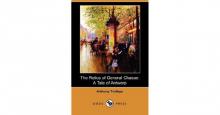 The Relics of General Chasse: A Tale of Antwerp
The Relics of General Chasse: A Tale of Antwerp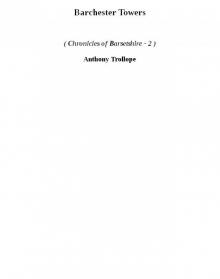 Barchester Towers cob-2
Barchester Towers cob-2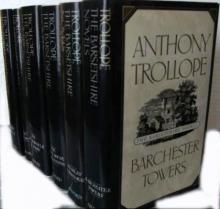 The Chronicles of Barsetshire
The Chronicles of Barsetshire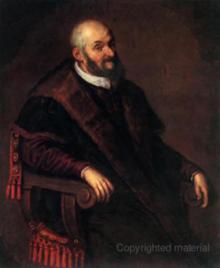 The Warden cob-1
The Warden cob-1 Framley Parsonage
Framley Parsonage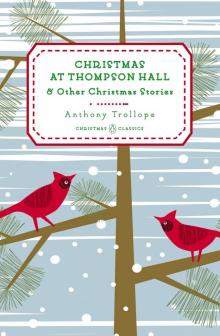 Christmas at Thompson Hall
Christmas at Thompson Hall The Warden
The Warden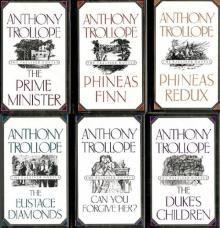 The Palliser Novels
The Palliser Novels The Small House at Allington
The Small House at Allington Barchester Towers
Barchester Towers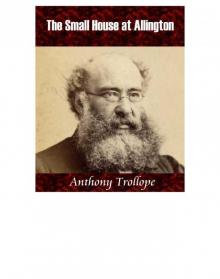 The Small House at Allington cob-5
The Small House at Allington cob-5 The Duke's Children
The Duke's Children Phineas Finn, the Irish Member
Phineas Finn, the Irish Member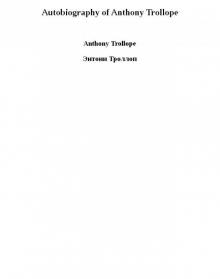 Autobiography of Anthony Trollope
Autobiography of Anthony Trollope